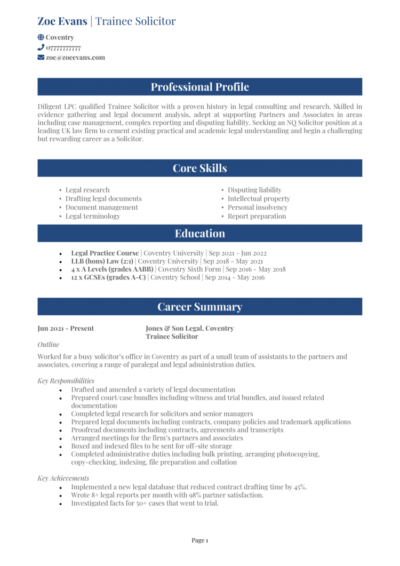You’ve studied the law, analysed case after case, and survived the LPC (or are halfway through it) – now it’s time to make your case. As a future solicitor, you’re used to building arguments backed by evidence – so treat your CV the same way.
This guide and its Trainee Solicitor CV examples will help you present your academic background, legal experience, and commitment to the profession in a structured, persuasive way – so you’ll have no trouble standing up in the court of recruiter opinion.
Trainee Solicitor CV
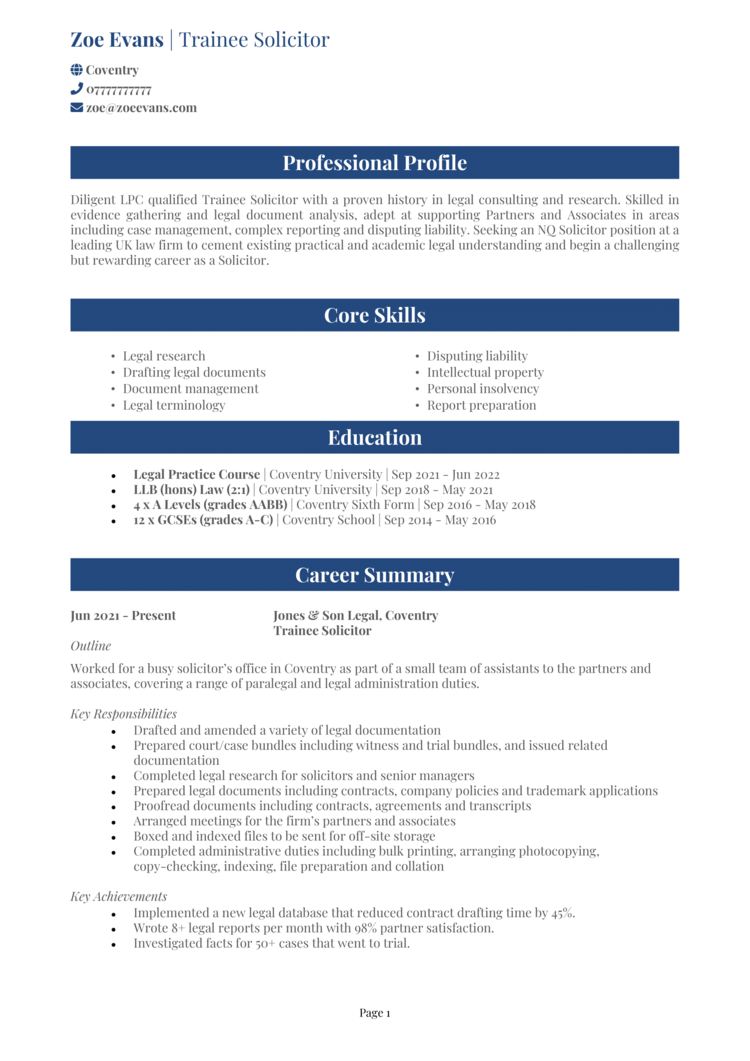
Newly Qualified Solicitor CV
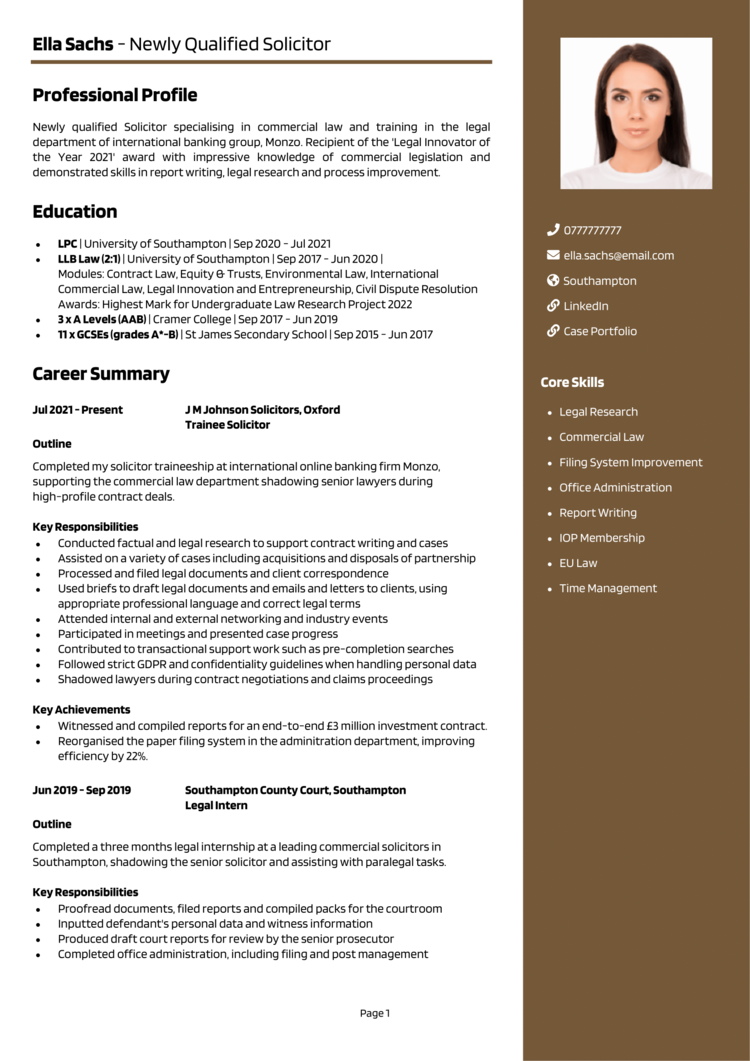
How to write your Trainee Solicitor CV
Discover how to create a quality Trainee Solicitor CV with this simple step-by-step guide.
Think of writing a CV as giving your opening statement – it should be clear and confident, and remain persuasive without overcomplicating the facts. Whether you’re applying to a city firm or a regional practice, clarity and relevance always win the case.
This guide will help you highlight your legal training, transferable skills, and work experience so that your application stands out – before it’s even read in full.
How should you structure and format a Trainee Solicitor CV?
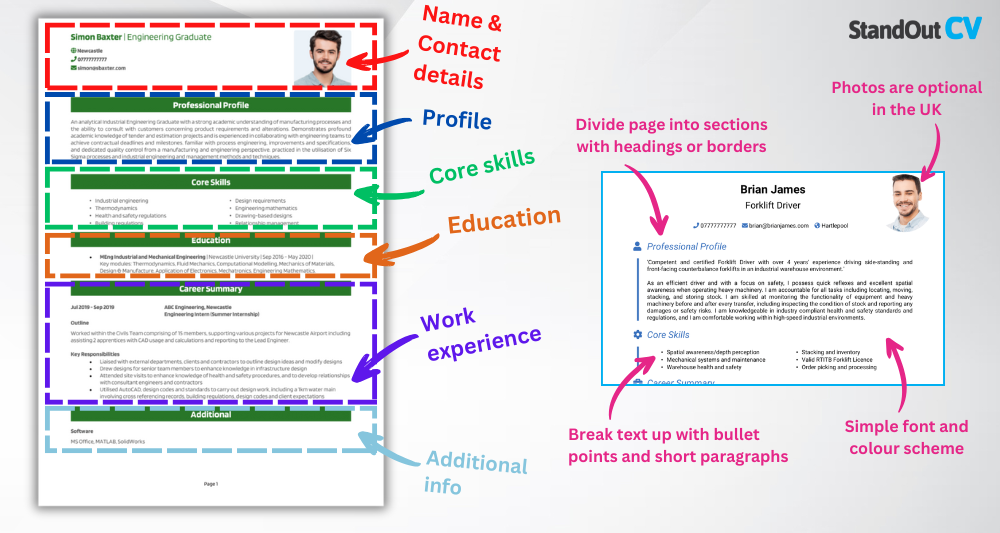
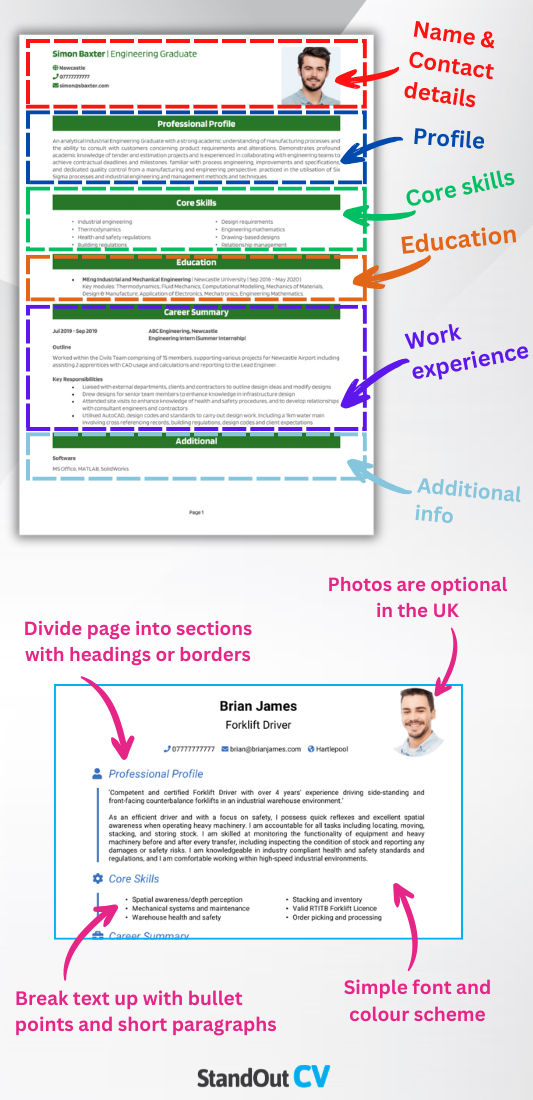
In law, structure is everything – and your CV should follow suit. Recruiters will be scanning quickly for key qualifications, legal exposure, and written communication skills, so your layout should be logical and easy to read. If a recruiter has to cross-examine your CV just to find your qualifications, you’ve already lost the argument.
Here’s the layout to follow:
- Name and contact details – Display your personal details clearly at the top so employers can get in touch easily. Including a photo is entirely optional.
- Profile – Begin with a concise summary that highlights your expertise and what you bring to the role.
- Core skills – Highlight relevant legal skills such as legal research, client communication, or document drafting.
- Work experience – Detail your legal placements, paralegal roles, internships, and any relevant non-legal work.
- Education & certifications – Mention your law degree, LPC/SQE status, and other qualifications.
- Additional info – Optionally list hobbies, societies, volunteering, or awards relevant to law.
If your CV reads like a statute book, the hiring team might object – keep it sharp: aim for one or two pages of length. Stick with clearly defined sections, consistent formatting, a clear font, and bullet points to help recruiters spot key information quickly. Making use of these tips will give you a format free of avoidable mistakes, which will impress any recruiter, even if you’ve got no experience.
Writing a Trainee Solicitor CV profile


A CV profile should show recruiters that you’re more than just a graduate with a law degree – you’re a future solicitor in the making. It’s your opportunity to highlight your academic background, practical exposure, and dedication to qualifying as a solicitor, with the overall aim of convincing hiring managers that you would bring genuine value to their firm.
As a candidate with less experience in the field, you should opt for a personal statement, which is longer and allows for more discussion of your aspirations, while your applications would be sent alongside a tailored cover letter.
Trainee Solicitor CV profile examples
Profile 1
Motivated Trainee Solicitor with strong academic credentials and practical experience gained through placements and paralegal work. Skilled in legal research, drafting contracts, and preparing case files. Familiar with litigation procedures, client interaction, and document bundling. Committed to developing expertise across practice areas and building a successful legal career.
Profile 2
Detail-oriented Trainee Solicitor currently completing a training contract with exposure to corporate law, property, and dispute resolution. Experienced in drafting client correspondence, attending court hearings, and supporting transactional work. Proficient in legal databases and document management systems. Eager to qualify as a solicitor and contribute to high-quality legal services.
Things to have in your Trainee Solicitor CV profile
Include the following:
- Legal education – Note your law degree or conversion, and current status with the LPC or SQE.
- Legal experience – Briefly mention placements, internships, or paralegal roles.
- Key strengths – Include attributes like research, drafting, commercial awareness, or communication.
- Career goals – Show that you’re committed to a legal career and state the kind of firm or practice area you’re interested in.
Writing an effective core skills section


Even early in your career, you’ve already built up skills firms care about – research, analysis, clarity under pressure. Your CV skills section is where you prove you’re already developing the core competencies of a solicitor.
Think about the transferable skills gained from study, placements, or extra-curriculars. Tailor your list to the role and firm, making use of the job description to identify the keywords recruiters are likely to be looking out for.
The top skills to highlight in your Trainee Solicitor CV
- Legal Research and Analysis – Investigating case law, statutes, and legal precedents to support client matters and internal memos.
- Drafting Legal Documents – Assisting in the preparation of contracts, witness statements, pleadings, and other formal documents.
- Client Communication and Support – Liaising with clients under supervision, managing correspondence, and gathering relevant information.
- Case Preparation and Bundling – Organising case files, preparing court bundles, and supporting solicitors ahead of hearings and trials.
- Due Diligence – Reviewing legal documents and conducting background checks for transactions such as mergers, acquisitions, or property deals.
- Court and Tribunal Attendance – Observing and occasionally assisting in court proceedings, hearings, or client meetings.
- Legal Compliance and Risk Management – Assisting in ensuring that legal work adheres to regulatory and professional conduct standards.
- Practice Area Rotations – Gaining experience across departments such as corporate, litigation, property, and family law.
- Billing and Time Recording – Logging billable hours accurately and contributing to client invoicing processes.
- Professional Development – Working toward qualification as a solicitor through the SQE or training contract route, while applying practical legal skills.
Highlighting your education


Legal roles are qualification-driven, so your education section should be clear and well-structured. Your legal education forms the foundation of your application – make it easy to follow and impressive to scan.
Mention your status with the LPC or SQE clearly – whether completed, ongoing, or planned. If you’ve done a law conversion course, highlight that too. As a junior candidate, you should clearly include relevant modules or coursework that show your interests align with the firm’s focus.
Example education sections
Education 1
Distinction LPC with MSc in Law, Business and Management | University of Law (London) | 2022–2023
Modules included Civil Litigation, Commercial Law, and Mergers & Acquisitions. Completed a supervised research project on the future of legal technology in UK firms. Undertook pro bono work with the university legal advice centre, advising clients on housing and employment issues.
First Class LLB (Hons) Law | University of Bristol | 2019–2022
Modules included Contract Law, Land Law, and Public International Law. Completed a dissertation on human rights and state surveillance legislation.
3x A-Levels (A*–B) | Redhill Sixth Form | 2017–2019
10x GCSEs (A*–C) | Elm Park School | 2015–2017
Education 2
Commendation GDL (Graduate Diploma in Law) | City, University of London | 2022–2023
Covered all core areas of law including Tort, Equity & Trusts, and Constitutional Law. Participated in mooting competitions and contributed to the student law journal.
Upper Second Class BA (Hons) History | University of Exeter | 2018–2021
Modules included Legal History, Political Theory, and Global Governance. Developed strong analytical and research skills through a dissertation on 19th-century legal reform.
3x A-Levels (A–C) | Colton Grammar School | 2016–2018
9x GCSEs (A*–B) | Eastwood High | 2014–2016
What to include in your education section
For each qualification, add the following info:
- Qualification & organisation – State your qualification and the awarding body.
- Dates studied – Say when you started the course and when the course ended, or if it’s ongoing.
- Extra details – Expand upon the particularly relevant modules, telling recruiters about the specific experience and skills which will be useful for your target jobs.
The best qualifications to boost a Trainee Solicitor CV
- LLB Law (or GDL Law Conversion) – Essential foundation for aspiring solicitors.
- LPC (Legal Practice Course) – Still accepted by many firms and shows you’re prepared for training contracts.
- SQE (Solicitors Qualifying Examination) – The new standard route to qualification – list your stage and completion date.
- Bachelor’s Degree (non-law, if converted) – Shows academic rigour if you transitioned via GDL.
- Additional Legal CPD or Compliance Training – Shows proactive development in specialist areas.
Showcasing your work experience


Law firms want to see more than legal theory – they want to see how you’ve applied it. Whether you’ve completed vacation schemes, legal internships, pro bono placements or worked as a paralegal, make it clear what you learned and contributed.
Even non-legal roles can count – just highlight what they say about your reliability or client-facing abilities: start with the most recent experience and work backwards, making sure to relate them back to legal practice. If you worked in retail, that’s client interaction. If you worked in a café, that’s time management. Frame it right.
Writing job descriptions for past roles

- Outline – Briefly describe the firm or organisation and your position.
- Responsibilities – Mention key tasks like research, drafting, shadowing solicitors, or client liaison. Use action words like “researched,” “drafted,” and “supported.”
- Achievements – Include tangible outcomes – such as contributing to a successful case, preparing a key document, or receiving positive feedback.
How to present past roles for Trainee Solicitor
Trainee Solicitor | Marlow & Bright lLP
Outline
Completed a training contract at a regional law firm, rotating through corporate, litigation, and private client departments.
Responsibilities
- Drafted commercial contracts, shareholder agreements, and corporate resolutions under supervision.
- Assisted in preparing court bundles, witness statements, and pre-trial documentation.
- Conducted legal research using Westlaw and LexisNexis to support ongoing matters.
- Attended client meetings and case conferences with senior solicitors.
- Managed client correspondence and assisted in the administration of estates.
Achievements
- Played a key role in completing a complex share purchase agreement worth £3.5M.
- Helped reduce turnaround time for court document preparation by introducing a filing checklist.
- Praised for professional conduct during client interactions and attention to legal detail.
Trainee Solicitor | Thornwick Legal Group
Outline
Undertook a training seat in the real estate department of a commercial law firm, assisting with property transactions and lease negotiations.
Responsibilities
- Drafted and reviewed contracts for sale, leases, and land registry applications.
- Supported due diligence processes, including reviewing title deeds and local authority searches.
- Corresponded with clients, agents, and solicitors to progress commercial transactions.
- Attended client meetings and assisted in resolving transactional queries.
- Maintained case files and ensured compliance with firm protocols and deadlines.
Achievements
- Contributed to the successful completion of a multi-site lease deal for a national retailer.
- Received recognition for improving file organisation and document accuracy.
- Consistently met transactional deadlines in a fast-paced team environment.
Additional info


For aspiring trainee solicitors, the Additional Information section offers a chance to showcase relevant qualities beyond academic achievements. It allows you to highlight interests, achievements, and personal initiatives that reflect critical thinking, communication, and a genuine passion for law – especially valuable when you’re early in your legal career.
Good additional info for Trainee Solicitor
- Hobbies – Activities that build communication, analytical thinking, or attention to detail—such as debating, reading legal thrillers, or writing—can help reinforce key legal traits.
- Awards and Achievements – Academic recognitions or success in mooting, essay competitions, or leadership roles can underline your motivation and legal aptitude.
- Extracurricular Activities – Engagement in law societies, mock trials, or mentoring schemes demonstrates initiative and practical interest in legal work.
- Personal Projects – Independent legal research, blogging on legal topics, or preparing for further qualifications shows a proactive and invested approach to your legal career.
Additional info example
Additional info
Hobbies
Debating – Participated in intercollegiate debates, developing persuasive communication and argument structuring.
Legal writing – Maintained a blog exploring current legal issues, improving research skills and clarity in legal analysis.
Reading legal biographies – Gained insight into different legal career paths and the evolution of UK case law.
Awards and Achievements
Essay competition runner-up – Recognised for writing on access to justice in the digital age.
Dean’s Commendation – Awarded for consistent academic performance and contribution to university life.
Extracurricular Activities
Law Society member – Attended talks with practising solicitors and joined peer networking sessions.
Mooting team participant – Delivered structured arguments in mock court settings, refining advocacy skills.
Personal Projects
Legal blog – Wrote monthly articles explaining legal developments in areas like privacy and employment law.


